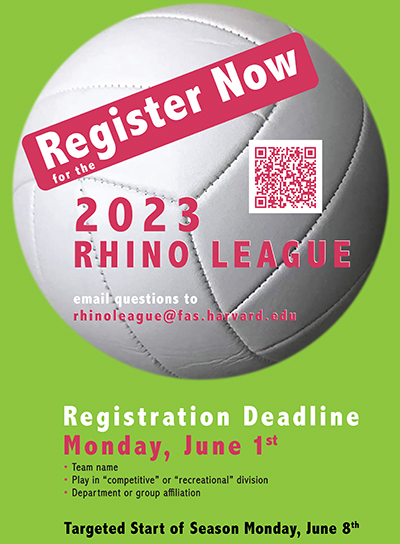The time-honored BioLabs tradition of summer Rhino League volleyball tournaments will continue this summer under the leadership of Dulac Lab Research Assistant Samantha Finkbeiner, who competed in last year’s Rhino League as a member of the championship-winning team the Fourth Floor Giants. Two of Finkbeiner’s teammates—Neuroscience graduate student Adam Lowet of the Uchida Lab and postdoc Paul Masset of the Murthy Lab and the Uchida Lab—will be assisting as commissioners, particularly later in the season after the teams have started playing.
Each summer, the sandy volleyball court in front of BioLabs becomes homebase for the Rhino League games. MCB hosts the league, but the competition draws in teams from other schools and departments, including OEB, SEAS, SCRB, and CCB, among others.Starting in May, teams of Harvard students, staff, researchers, and faculty battle it out for fun, bragging rights, and a homemade trophy, culminating in a 32 team tournament at the end of August.
However, organizing the summer smackdown is no easy feat. It requires coordinating dozens of people’s schedules, setting up play-off brackets, and officiating the games. Finkbeiner will be taking point on these projects as a Rhino League commissioner. Her plan is to automate much of the scheduling and match-up process using Google forms that feed into spreadsheets, reducing the workload for future seasons’ commissioners. “It’s pretty in my wheelhouse,” Finkbeiner says. “My mom’s a finance manager, so I grew up making stupid spreadsheets.” During her time as Rhino League Commissioner, Finkbeiner will also set up a tutorial explaining the spreadsheets so that future commissioners can step in with ease.
https://forms.gle/5T6ZF1sCq6vTxSUr5
The sign-up period for the Rhino League is starting now and will run through June 1st. To sign up, teams need to provide a team name, a captain’s name and email address, and an alternate contact’s name and email address. Standard Rhino League games are six versus six, and teams need a minimum of four players present for each game they play. Anyone with a Harvard ID can play, but they can only play for one team officially. The Rhino League teams are grouped as either competitive, meaning the players intend to be in contention for the Rhino Cup championship, or recreational. Teams should indicate whether they’d like to be considered competitive or recreational at the time of sign-up. Questions can be sent to rhinoleague@fas.harvard.edu.
Rhino League has been a core feature of Finkbeiner’s MCB experience. She joined the department in December 2021, shortly after earning her undergraduate degree Her work in the Dulac Lab largely consists of conducting wet lab experiments to support postdoctoral researchers’ projects.
When she first arrived at MCB, Finkbeiner wasn’t sure how to get involved, but, at last spring’s May Corona Bash, she saw the sign-up sheets for the Rhino League and decided to find a team. Volleyball was her favorite sport growing up, and she played it competitively until high school. Rhino League offered her an opportunity to exercise those skills, as well as meet people her age from around the department. She joined the Fourth Floor Giants, a team that would go on to win the 2022 Rhino Cup.
Finkbeiner says that playing in the 2022 Rhino League season was a blast. “It’s a welcoming environment, definitely,” she says. “It was really nice to have something that people do every single year that people can just go and join in and join the community immediately.”
Being the shortest member of the Fourth Floor Giants could sometimes be inconvenient. “One of the games I remember the most was one where Nacho [Sanguinetti] elbowed me in the head,” Finkbeiner explains. “He knocked an earring out of my head. We had to stop and look for it everywhere.”
Still, she forged a bond with everyone on her team. “They all read all my applications for graduate school and gave me notes,” Finkbeiner says.”It just helped build a tiny little family for the short amount of time that I’ve been able to be here.”
Finkbeiner and the Fourth Floor Giants played well throughout the 2022 season, making it to the final championship game where they faced off against league regulars Cobra Kai, a group of current and retired Environmental Health and Safety (EHS) employees who play every year.
“During Rhino Cup, the very last game that we were playing, everybody was out there,” Finkbeiner says. “It was like we were on a stage; it was so fun. It was so cool. It was so nice to see the whole department gather together to watch us duke it out.”
The match was close, but, in the end, the Fourth Floor Giants prevailed, earning the coveted Rhino Cup trophy.
Finkbeiner will be playing with the Fourth Floor Giants again in the 2023 season, until she starts graduate school at Northeastern University this summer.
As a PhD graduate student, Finkbeiner plans to join James Monaghan’s lab and apply computational modeling techniques to the study of limb regeneration in axolotl salamanders.“I’m sad to leave in the middle of Rhino League, but I’m extremely excited to start the next step in my academic career,” she says. “Catherine and many others in the Dulac Lab helped me with my applications and gave advice along the way, I feel really lucky to have worked in this lab.”
In the meantime, Finkbeiner encourages everyone to get involved with the Rhino League. Finding a team can be as simple as striking up a conversation in the BioLounge or in a hallway. For those who cannot play, there are lots of opportunities to spectate or even serve as a “Team Mom” supporting individual teams.
The sign-up sheet for 2023 Rhino League is here.Teams should register by June 1st to allow time for setting the league schedule. Questions can be directed to rhinoleague@fas.harvard.edu. Rhino League games are projected to start by June 8th. We hope to see everyone come out, either as players or supporters.




